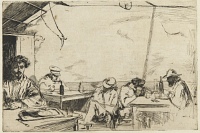Etchings Institutions search term: parsons
Soupe à trois sous | ||
| Number: | 64 | |
| Date: | 1859 | |
| Medium: | etching | |
| Size: | 152 x 228 mm | |
| Signed: | 'Whistler. -' at upper right | |
| Inscribed: | no | |
| Set/Publication: | no | |
| No. of States: | 1 | |
| Known impressions: | 56 | |
| Catalogues: | K.49; M.49; T.25; W.27 | |
| Impressions taken from this plate (56) | ||
TECHNIQUE
This is an etching, often richly inked and printed with slight retroussage, so some lines resemble drypoint. Several light vertical lines to the right of the rightmost seated figure may, in fact, be drypoint. The Pennells commented,
'For the only time, and as a result of his training at Washington,
his handling threatened to become mannered. But in some
of the prints, ... done during these years, like the Drouet, Soupe a Trois
Sous, Bibi Lalouette, he had perfected his early style of
drawing, biting and dry-point.' 14
14: Pennell 1908 , I, p. 72.
PRINTING
Over fifty impressions of this etching have been located in public collections. This is a large number, considering it was not published, and raises the question (since the copper plate has not been located) of whether some are posthumous impressions. If they date from Whistler's lifetime, they were certainly not printed by him. However, the quality of impressions is quite high, and it may be very difficult to tell.
Lifetime impressions include ones on buff wove paper with pale blue fibres ( ); dark ivory wove, signed by Whistler with a butterfly about 1875 (
); dark ivory wove, signed by Whistler with a butterfly about 1875 ( ); heavy-weight greyish off-white laid (
); heavy-weight greyish off-white laid ( ); ivory laid with a coat of arms watermark (
); ivory laid with a coat of arms watermark ( ); and several on Asian papers including off-white (
); and several on Asian papers including off-white ( ) and cream Japanese laid paper (
) and cream Japanese laid paper ( ,
,  ,
,  ).
).
 ); dark ivory wove, signed by Whistler with a butterfly about 1875 (
); dark ivory wove, signed by Whistler with a butterfly about 1875 ( ); heavy-weight greyish off-white laid (
); heavy-weight greyish off-white laid ( ); ivory laid with a coat of arms watermark (
); ivory laid with a coat of arms watermark ( ); and several on Asian papers including off-white (
); and several on Asian papers including off-white ( ) and cream Japanese laid paper (
) and cream Japanese laid paper ( ,
,  ,
,  ).
).Less certainly but probably lifetime impressions are also on both Asian and western papers. Several are on laid papers - a pinkish ivory paper ( ); ivory, removed from a book, with Strasbourg Lily watermark (
); ivory, removed from a book, with Strasbourg Lily watermark ( ); ivory 'modern' (post-1800) (
); ivory 'modern' (post-1800) ( ); thin cream 'modern' paper with scallop shell watermark (
); thin cream 'modern' paper with scallop shell watermark ( ); browned ivory (
); browned ivory ( ), thin beige (
), thin beige ( ) and off-white paper (
) and off-white paper ( ). Several are on Asian papers (
). Several are on Asian papers ( ,
,  ,
,  ).
).
 ); ivory, removed from a book, with Strasbourg Lily watermark (
); ivory, removed from a book, with Strasbourg Lily watermark ( ); ivory 'modern' (post-1800) (
); ivory 'modern' (post-1800) ( ); thin cream 'modern' paper with scallop shell watermark (
); thin cream 'modern' paper with scallop shell watermark ( ); browned ivory (
); browned ivory ( ), thin beige (
), thin beige ( ) and off-white paper (
) and off-white paper ( ). Several are on Asian papers (
). Several are on Asian papers ( ,
,  ,
,  ).
).Impressions with uncertain early history, which therefore might be later (but with no other reason for considering them to be late) are on cream wove paper ( ) and others on laid paper (
) and others on laid paper ( ), in shades of buff (
), in shades of buff ( ,
,  ), cream (
), cream ( ), and pale green (
), and pale green ( ). One impression is on a grey chine collé (
). One impression is on a grey chine collé ( ). A number are on Asian papers (
). A number are on Asian papers ( ,
,  ,
,  ) including light-weight Japanese papers, some as fine as tissue (
) including light-weight Japanese papers, some as fine as tissue ( ,
,  ).
).
 ) and others on laid paper (
) and others on laid paper ( ), in shades of buff (
), in shades of buff ( ,
,  ), cream (
), cream ( ), and pale green (
), and pale green ( ). One impression is on a grey chine collé (
). One impression is on a grey chine collé ( ). A number are on Asian papers (
). A number are on Asian papers ( ,
,  ,
,  ) including light-weight Japanese papers, some as fine as tissue (
) including light-weight Japanese papers, some as fine as tissue ( ,
,  ).
).
